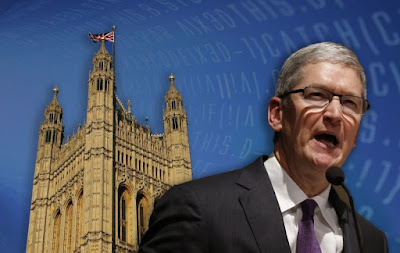Apple blasts U.K. bill on ‘backdoor’ access to encrypted messages
Apple blasts U.K. bill on ‘backdoor’ access to encrypted messages
 |
Apple CEO Tim Cook is defending his opposition to providing intelligence agencies with backdoors to access encrypted information on his company’s products.
In the wake of the Paris terrorist attack, in which assailants are believed to have used encrypted devices to avoid government surveillance, politicians and law enforcement agencies have called for measures to prevent tech companies from fully encrypting users’ communications.
In the wake of a renewed debate over the use of encrypted communications, Apple is urging the British Parliament to reconsider its new beefed-up surveillance proposals.
In the wake of a reestablished discuss over the utilization of encoded correspondences, Apple is encouraging the British Parliament to rethink its new bulked up reconnaissance proposition.
The organization presented an emphatic complaint to the U.K's. Scrutiny Committee today in a reaction to a law drafted in November. In the event that passed this spring, the enactment — named the Investigatory Powers Bill — would lawfully oblige organizations to sidestep encryption at the solicitation of the legislature, among numerous different procurements.
The eight-page letter, which was given to Yahoo News by Apple, contends that the bill being referred to "debilitates to hurt reputable residents in its push to battle the couple of awful on-screen characters who have an assortment of approaches to do their assaults." The California-based organization, which has included scrambled security measures in its PCs and cell phones for more than 10 years, contended that driving secondary passages into items "would debilitate the insurances incorporated with Apple items and imperil every one of our clients."
The move comes in the midst of a warmed level headed discussion about the utilization of encryption in shopper innovation, impelled by disclosures that terrorists might have imparted by means of scrambled informing administrations, for example, WhatsApp and Telegram before the Nov. 13 Paris assaults.
FBI Director James Comey has contended that terrorists are progressively utilizing this innovation — which scrambles the substance of a message so that just its sender and beneficiary can read it — to "go dull." In a late Senate hearing, he approached U.S. tech organizations that offer end-to-end encryption to reevaluate their plans of action, inferring they ought to give excellent access to the administration when required. Cryptographers and cybersecurity activists collectively concur that there's no real way to do this without totally bargaining the security of all encoded interchanges. Real tech organizations, including Google, Microsoft and Facebook, have battled law authorization in court and at the administrative level over this issue for a considerable length of time.
The United Kingdom is only one of numerous nations to propose enactment went for controlling encryption. Not long after the assaults in Paris, the French daily paper Le Monde distributed archives examining potential enactment to "disallow free and shared Wi-Fi associations" amid crises and obstruct the utilization of the Tor secrecy system. (Executive Manuel Valls denies that these proposition ever existed.) In the United States, Sen. Dianne Feinstein, D-Calif., and Senate Intelligence Chairman Richard Burr, R-N.C., as of late reported they want to pass a law that would oblige organizations to unscramble information under court request.
"I think this world is truly changing regarding individuals needing the assurance and needing law requirement, if there is connivance going ahead over the Internet, that that encryption should have the capacity to be pierced," Feinstein said recently.
Apple's affirmation contended that "inexorably more grounded — not weaker — encryption is the most ideal approach to secure against" terrorist dangers. It likewise suggested that the bill give more detail on what may be required of the individuals who are served warrants, and parts of it ought not have any significant bearing to abroad suppliers.
"This would immobilize generous parts of the tech area and flash genuine worldwide clashes," it peruses. "It would likewise likely be the impetus for different nations to authorize comparative laws, deadening multinational organizations under the heaviness of what could be handfuls or many opposing nation particular laws."
In spite of the fact that Apple complies with law authorization demands by giving certain sorts of metadata, it has likewise denied court access to encoded correspondences that happen in iMessage and FaceTime. This past summer, for case, the Justice Department acquired a court request for a case including tranquilizes and weapons, requesting Apple turn over continuous instant messages between suspects utilizing iPhones. The organization reacted by saying it couldn't in fact go along.
In another case this fall, Apple said it could possibly recoup data on cell phones running iOS 7, but since "open affectability to issues in regards to computerized protection and security is at an exceptional level," doing as such "could undermine the trust in the middle of Apple and its clients and generously discolor the Apple brand" and at last cause "a more extended term mone





Post a Comment